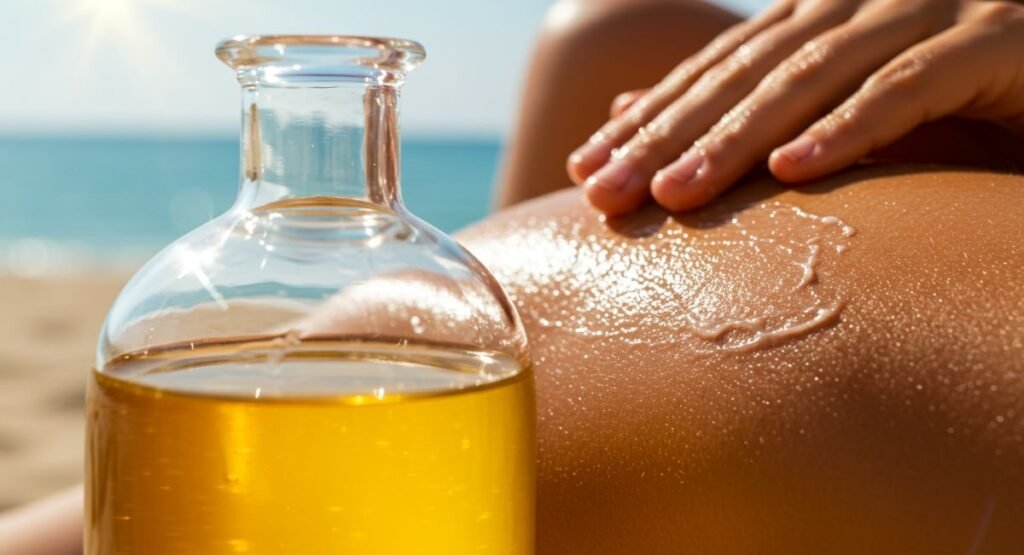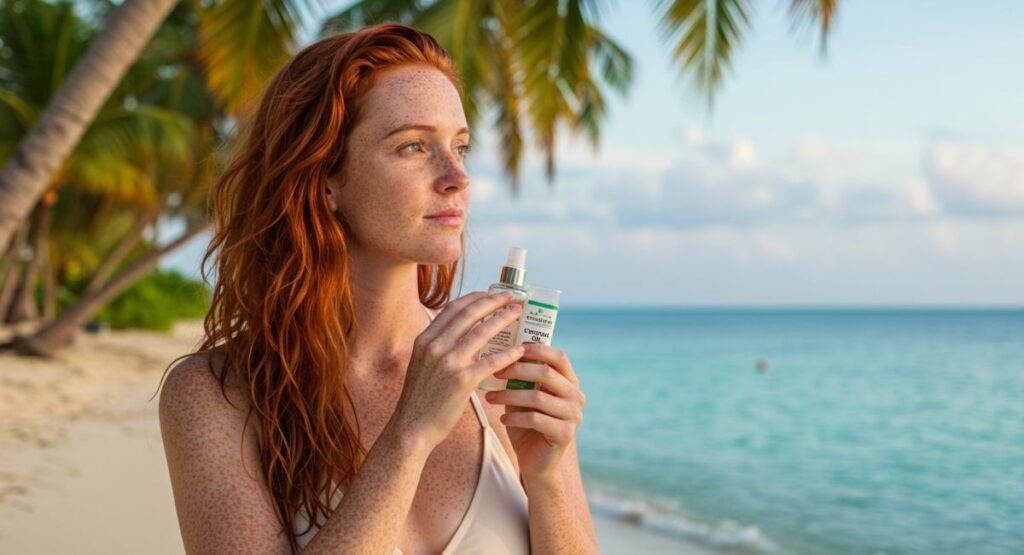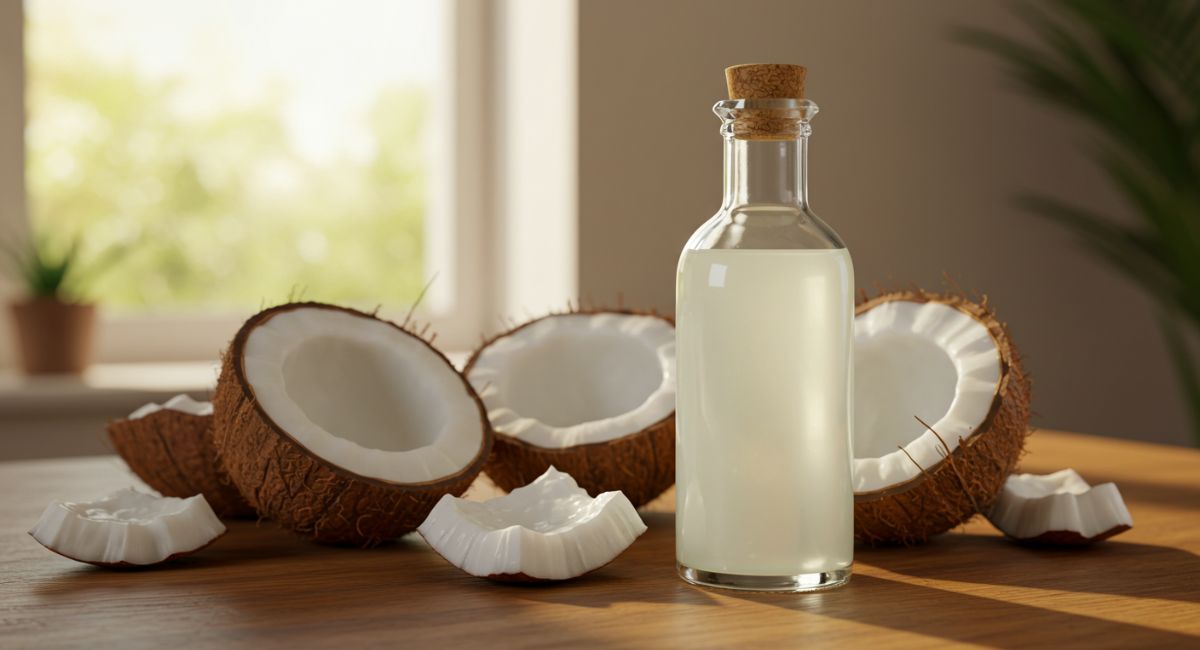Is Coconut Oil Good for Sun Protection?What You Need to Know
Table of Contents
Have you ever been caught without sunscreen on a bright summer day and wondered if that jar of coconut oil in your beach bag could save your skin? Perhaps you’ve seen wellness influencers touting coconut oil as a “natural sunscreen” and while basking in tropical sunshine. With its delightful scent and versatility as a beauty product, it’s tempting to believe coconut oil could be the perfect all-natural sun protection solution you’ve been searching for.
But before you slather yourself with this tropical elixir and head outdoors, it’s crucial to understand what the science actually says about coconut oil and sun protection. Your skin’s health depends on making informed decisions—especially when it comes to preventing sun damage.
Understanding Sun Protection Basics
How Sun Damages Your Skin
When you step outside, your skin faces an invisible yet powerful force: ultraviolet (UV) radiation. These rays come in two primary forms that affect your skin:
- UVA rays: These penetrate deep into your skin, causing premature aging, wrinkles, and contributing to skin cancer risk.
- UVB rays: These primarily affect the outer layers of skin, causing sunburns and playing a major role in the development of skin cancer.
Without adequate protection, UV exposure leads to both immediate damage (sunburn) and long-term consequences (premature aging, increased cancer risk).

What Makes Effective Sun Protection
Effective sun protection requires blocking or absorbing both UVA and UVB rays before they damage your skin cells. This is typically measured using the Sun Protection Factor (SPF) scale.
SPF indicates how much longer you can stay in the sun without burning compared to having no protection. For example, SPF 30 theoretically allows you to stay in the sun 30 times longer without burning than you could with unprotected skin.
Proper sun protection should:
- Block both UVA and UVB rays (broad-spectrum protection)
- Have sufficient SPF (dermatologists generally recommend SPF 30+)
- Be water-resistant if you’ll be swimming or sweating
- Be applied correctly and reapplied regularly
Coconut Oil Properties and Composition
Natural Components of Coconut Oil
Coconut oil contains several compounds that make it valuable in skincare:
| Component | Benefit |
|---|---|
| Medium-chain fatty acids | Moisturizing properties |
| Vitamin E | Antioxidant benefits |
| Lauric acid | Antimicrobial properties |
| Phenolic compounds | Minor antioxidant effects |
Its popularity in beauty routines stems from its versatility—from hair conditioning to makeup removal to moisturizing dry skin.

Coconut Oil’s Natural SPF Value
Here’s where we need to examine the claims carefully. Scientific studies have determined that coconut oil has a natural SPF of approximately 4-8, depending on quality and processing methods.
This means:
- Blocks only about 20% of UV radiation (compared to SPF 30, which blocks 97%)
- Primarily filters UVB rays but offers minimal UVA protection
- Protection dissipates quickly as the oil absorbs into skin or is removed by sweat/water
Scientific Evidence: Coconut Oil vs. Commercial Sunscreens
What Research Shows
Multiple dermatological studies have examined natural oils’ sun protection capabilities. A 2016 study published in the International Journal of Cosmetic Science found that while coconut oil does absorb some UV radiation, its protection falls far below the recommended minimum SPF 30.
“Natural oils may contribute some low-level sun protection, but none approach the minimal SPF threshold recommended by dermatologists for adequate protection against harmful UV radiation.” – Journal of the American Academy of Dermatology
Comparison with Commercial Sunscreens
Coconut Oil vs. Commercial Sunscreens Comparison
| Feature | Coconut Oil | Commercial Sunscreen (SPF 30+) |
|---|---|---|
| SPF Rating | 4-8 | 30-100+ |
| UVA Protection | Minimal | Broad-spectrum formulas provide significant protection |
| UVB Protection | Limited | Blocks 97-99% of UVB rays |
| Water Resistance | Poor | Available in water-resistant formulations |
| Duration of Protection | Short-lived | 40-80 minutes with water-resistant formulations |
| Testing & Regulation | Not tested or regulated for sun protection | FDA regulated with standardized testing |
| Consistency of Protection | Variable depending on quality and application | Consistent when used as directed |
| Reapplication Needs | Would require very frequent reapplication | Every 2 hours or after swimming/sweating |
This comparison reveals a stark difference in effectiveness. While coconut oil provides minimal protection that might slightly delay burning compared to no protection at all, it falls dramatically short of the protection provided by commercial sunscreens.

Potential Risks of Relying on Coconut Oil
Relying exclusively on coconut oil for sun protection carries significant risks:
- False sense of security: You might stay in the sun longer thinking you’re protected
- Increased burn risk: Insufficient SPF means you’ll burn faster than with proper sunscreen
- Long-term damage accumulation: Even without visible burning, UV damage accumulates over time
- Higher skin cancer risk: Inadequate protection contributes to increased lifetime UV exposure
Beneficial Ways to Use Coconut Oil for Sun Care
Despite not being suitable as a primary sun protectant, coconut oil does have legitimate benefits in a comprehensive sun care routine.
After-Sun Care Applications
Coconut oil shines in after-sun care. Its moisturizing properties can help:
- Soothe sun-exposed skin with its anti-inflammatory properties
- Restore moisture to dehydrated skin after sun exposure
- Support the skin barrier which may be compromised after UV exposure
Apply coconut oil after showering following sun exposure to lock in moisture and help calm irritated skin.
Complementary Use with Commercial Sunscreens
Some people incorporate coconut oil as part of a layered approach:
- Apply proper broad-spectrum sunscreen as your primary protection
- Allow it to fully absorb (15-30 minutes)
- Apply a thin layer of coconut oil on top for additional moisture
- Continue to reapply sunscreen as directed
Important note: Never mix coconut oil directly with sunscreen before application, as this can dilute and compromise the sunscreen’s effectiveness.

Expert Recommendations for Sun Protection
Dermatologist Guidelines
Dermatologists consistently recommend a comprehensive approach to sun protection:
Primary Protection Methods
- Broad-spectrum sunscreen (SPF 30+)
- Protective clothing (UPF-rated fabrics, wide-brimmed hats)
- Seeking shade especially during peak hours (10am-4pm)
- Sunglasses with UV protection
Proper Sunscreen Application
For effective protection:
- Apply sunscreen 15-30 minutes before sun exposure
- Use approximately 1 ounce (a shot glass full) for full-body coverage
- Reapply every 2 hours or after swimming/sweating
- Pay attention to often-missed areas (ears, back of neck, tops of feet)
Natural Sun Protection Alternatives
If you prefer natural approaches, consider these alternatives that offer more protection than coconut oil:
- Zinc oxide or titanium dioxide mineral sunscreens (physical blockers)
- Red raspberry seed oil (estimated SPF 28-50, though not FDA tested)
- Clothing made from UPF-rated fabrics
- Natural shade from trees, umbrellas, or structures
Common Misconceptions About Coconut Oil and Sun Protection
Myth: “Natural” Means Better Protection
Many people equate natural products with better safety profiles. While coconut oil is indeed natural, “natural” doesn’t automatically mean “effective” for sun protection. Your skin naturally burns when overexposed to UV radiation—nature requires respect and understanding, not just blind trust.
Myth: Coconut Oil Prevents Burning Completely
Some wellness influencers claim complete sun protection from coconut oil, often based on personal anecdotes rather than scientific evidence. These claims typically:
- Ignore individual skin type differences
- Don’t account for varying UV intensity by location/season
- Confuse delayed burning with adequate protection
Myth: Tanning with Coconut Oil is Safe
Perhaps the most dangerous misconception is that coconut oil creates a “safe tan.” Remember this crucial fact: There is no such thing as a safe tan. A tan is your skin’s response to damage and represents DNA harm at the cellular level.
Refer to this article for more info.
Creating a Balanced Sun Care Routine
Integrating Coconut Oil Responsibly
A balanced approach might include:
- Primary protection: Commercial broad-spectrum sunscreen, protective clothing, and shade
- Secondary moisturizing: Coconut oil applied after sun exposure
- Skin-supporting nutrition: Diet rich in antioxidants that support skin health
Personalized Approaches for Different Skin Types
Your sun protection needs vary based on several factors:
For Fair Skin (Types I-II)
- Higher SPF (50+)
- More frequent reapplication
- Greater emphasis on physical protection (clothing, shade)
- Coconut oil solely for after-sun care
For Medium to Dark Skin (Types III-VI)
- Minimum SPF 30
- Regular reapplication
- Balanced approach to physical and chemical protection
- Coconut oil as moisturizer after sun exposure
DIY Sun Protection Options (With Caveats)
If you’re committed to a DIY approach, understand that while these options may offer slightly more protection than coconut oil alone, they still fall short of commercial sunscreens and should not be your primary defense.
Enhanced Coconut Oil Formulations
Some DIY enthusiasts create enhanced versions by adding:
- Zinc oxide powder (a physical blocker)
- Red raspberry seed oil
- Carrot seed oil
- Shea butter
Important warning: Homemade sunscreens lack the rigorous testing of commercial products. Their protection is inconsistent and typically inadequate.
When DIY Is Not Appropriate
Avoid DIY sun protection completely if:
- You have a history of skin cancer
- You have photosensitive conditions
- You’re taking medications that increase sun sensitivity
- You’ll be experiencing extended sun exposure
Key Takeaways
- Limited protection: Coconut oil has an SPF of approximately 4-8, far below the recommended minimum of SPF 30
- Insufficient coverage: It primarily blocks some UVB rays but offers minimal protection against harmful UVA rays
- Better alternatives exist: Commercial broad-spectrum sunscreens provide significantly superior protection
- Beneficial after sun: Coconut oil shines as an after-sun moisturizer rather than a preventative measure
- False security: Relying solely on coconut oil for sun protection creates dangerous false confidence
- Comprehensive approach needed: Effective sun protection combines proper sunscreen, protective clothing, seeking shade, and sun-smart behavior
Is Coconut Oil Good for Sun Protection: Conclusion
so,Is Coconut Oil Good for Sun Protection? While coconut oil offers numerous beauty and skincare benefits, adequate sun protection simply isn’t one of them. Its natural SPF of 4-8 falls far short of dermatologists’ recommendations for preventing both immediate and long-term sun damage.
Instead of risking your skin’s health, embrace coconut oil for what it does best—moisturizing and soothing skin after sun exposure. For actual protection before heading outdoors, stick with broad-spectrum sunscreens (SPF 30+), protective clothing, and sensible sun habits.
Your skin is your body’s largest organ and deserves proper protection. Make informed choices based on scientific evidence rather than wellness trends, and you’ll maintain healthier, younger-looking skin for years to come.
Is Coconut Oil Good for Sun Protection: Frequently Asked Questions
Q: Can I boost coconut oil’s SPF by adding other natural ingredients?
A: While adding ingredients like zinc oxide can increase protection, homemade formulations lack the testing and consistency of commercial products. Their effectiveness remains limited and unpredictable.
Q: Does coconut oil work better for sun protection on darker skin tones?
A: No. While darker skin has some natural protection equivalent to approximately SPF 13, coconut oil’s limited SPF is insufficient regardless of skin tone. All skin types require proper broad-spectrum protection.
Q: Will coconut oil prevent tanning?
A: Coconut oil will not effectively prevent tanning, which is actually a sign of skin damage. Its low SPF allows significant UV penetration, which triggers the tanning response.
Q: Is virgin coconut oil better for sun protection than refined?
A: Virgin coconut oil may have slightly higher antioxidant content, but the difference in sun protection is negligible. Neither version provides adequate SPF for safe sun exposure.
Q: Can I apply coconut oil over my regular sunscreen for added benefits?
A: You can apply coconut oil after sunscreen has fully absorbed (15-30 minutes), but be aware that oils can sometimes degrade sunscreen ingredients or make them wash off more easily. Never mix them together before application.
Q: How soon after sun exposure should I apply coconut oil for after-sun care?
A: Wait until skin has cooled down completely and you’ve showered to remove any sunscreen residue. Applying coconut oil to overheated skin can trap heat and potentially worsen irritation.
Author’s Top Picks
- The Best Ways on how to protect Tattoo from Sun Damage in 2025
- Best Way on how to Protect Hair from Sun and (Still Look Cute)
- Best Natural Sun Protection for Every Skin Type in 2025 (No Sunscreen Needed!)
- The Best Polarized Sunglasses for Your Needs: Why Sunglasses Are Essential for Sun Protection (Beyond Fashion!)





